TSUNAMI LATEST
* Tsunami waves crash into Tonga after undersea volcano erupts – booms heard in many Pacific countries, including parts of NZ
* Pacific countries on tsunami watch – surging seas have damaged boats in a popular NZ coastal settlement
* A Tongan resident fleeing the waters calls on people to pray for her family
* Huge eruption caught by satellite imagery – experts say it's one of the most violent eruptions ever captured
Tsunami waves have crashed into homes in Tonga following a devastating and violent volcanic eruption – and multiple Pacific countries are on alert including New Zealand where surging seas have damaged boats in a popular North Island coastal settlement.
Video footage shows waves washing through homes, properties and a church in Tonga – but there is no word yet on injuries or any fatalities, with power out and communication extremely limited. "Pray for us," wrote one Tongan resident on social media, as people fled to higher ground amid panicked screaming.
With much of the country covered in ash, there are fears that many people are struggling to breathe and that fresh drinking water might be limited.
The New Zealand Defence Force said this morning it was still monitoring the situation in Tonga and stood ready to assist if requested by the Tongan government.
The tsunami followed the eruption of Hunga Tonga-Hunga Haʻapai, an underwater volcano, sending ash, steam and gas up to 20km into the air.
The volcanic eruption sparked tsunami warnings and alerts in multiple countries including Fiji, Samoa, Vanuatu, Australia and New Zealand – but there are claims that the New Zealand civil defence "activity alert", at 8.14pm on Saturday, was too little, too late.
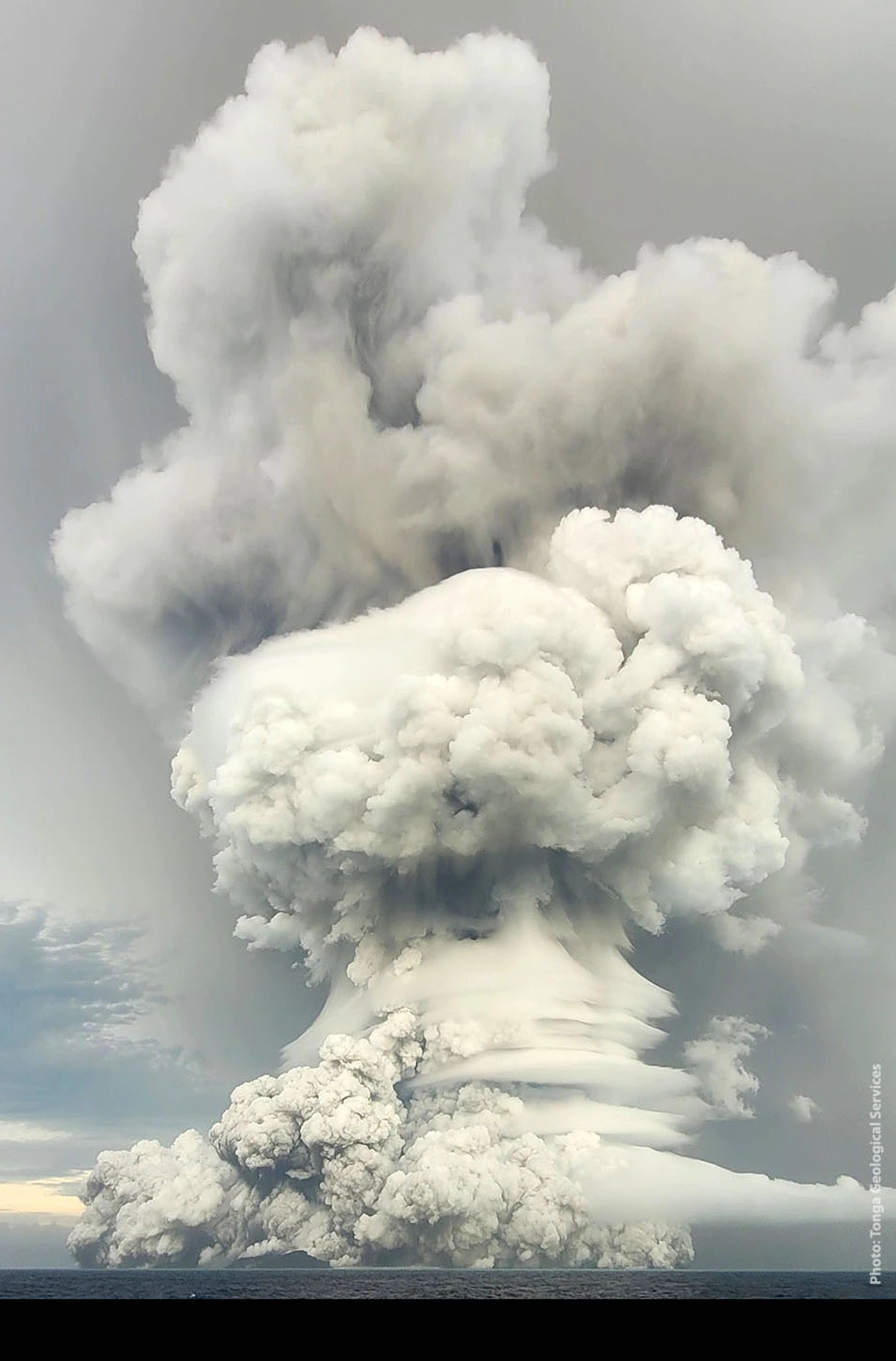
Clouds of ash, steam and gas rise from the ocean after Hunga Tonga-Hunga Haʻapai's eruption. Photo / Supplied
New Zealand's National Emergency Management Agency sent the National Advisory alert to notify of tsunami activity. "We expect New Zealand coastal areas on the north and east coast of the North Island and the Chatham Islands to experience strong and unusual currents and unpredictable surges at the shore," it tweeted.
The surging seas have damaged boats in the Tutukaka marina, with images showing vessels pulled from their moorings and some left marooned.
"My boat and many others have been completely destroyed by a tsunami that has hit Tutukaka Marina in Whangarei," one local told the Herald early today.
"Multiple boats have been destroyed. The wave cleared the breakwater which is around 2m higher than the high tide line. There was absolutely no Civil Defence warning, no tsunami siren activated and no phone notifications. We read a notice on the news earlier and took little notice. We have had multiple tsunami alerts [previously] which has triggered the alarm system and boats have been completely fine."
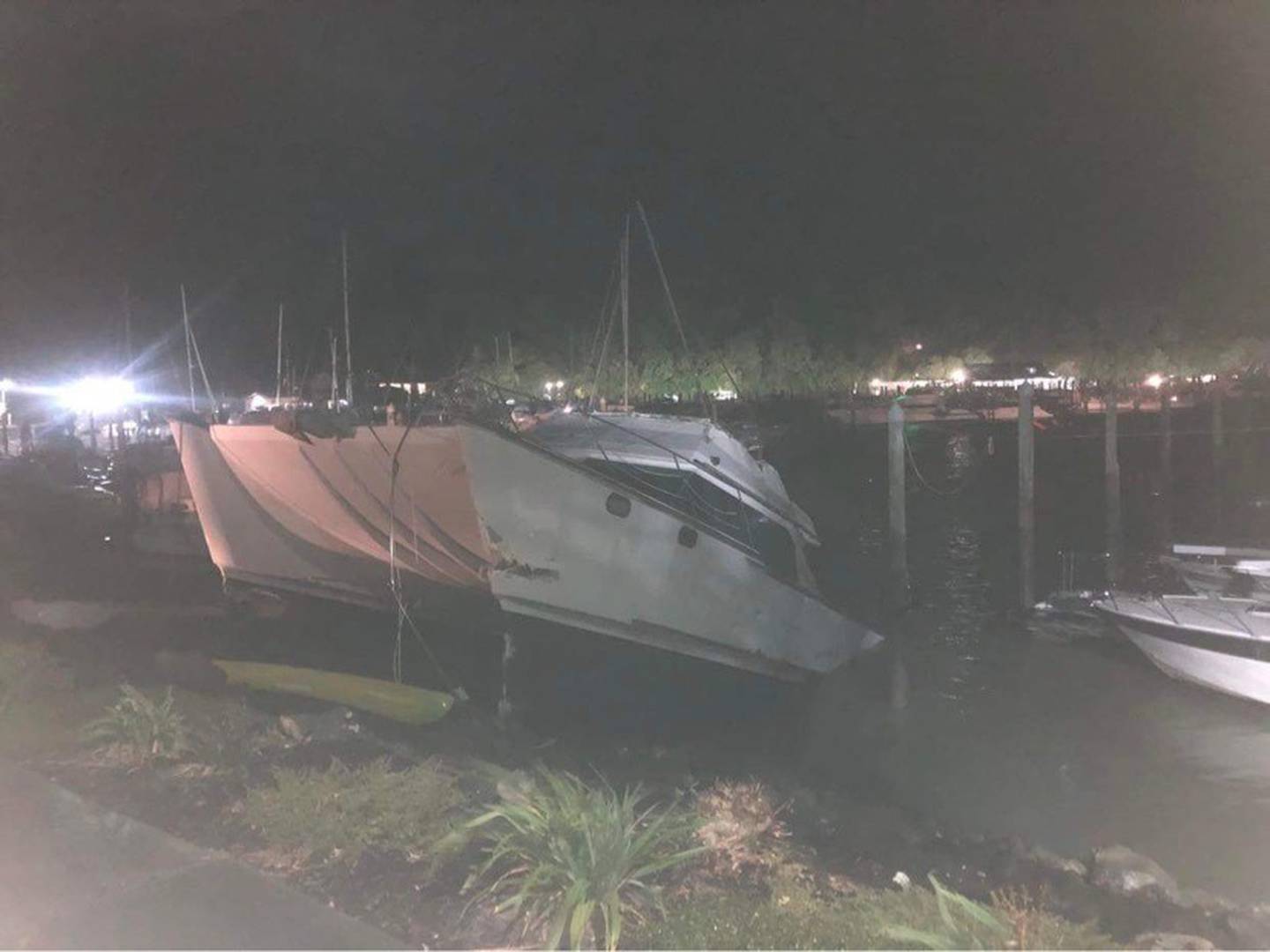
Boats broke their moorings at Tutukaka as tidal surges rolled in. Photo / James Littlewood, Twitter
Just before midnight, Northland Civil Defence confirmed "significant damage" at the Tutukaka marina.
"We're aware of a number of impacts that have taken place along Northland's east coast this evening. These impacts have generally been localised and either in, or close to, the water, but in at least one instance have caused significant damage: Tutukaka Marina, where there has been damage to a number of boats and marina structures, with people who live on their boats within the marina evacuated as a precaution."
Elsewhere in Northland, Civil Defence said, a number of coastal campgrounds were evacuated or campers relocated due to incoming waves.
"It's a challenge to distinguish the effects of the storm surge generated by Cyclone Cody, from currents/surges resulting from the volcanic eruption in Tonga, but our best assessment at this stage is that the two combined in a number of specific places, with local landforms also playing a part."
Cleanup has begun in earnest this morning and Civil Defence said it was "sad news" for a number of boat owners.
Hauraki Gulf Weather said the largest wave to hit New Zealand so far from the Tonga eruption was 1.33 metres.
"A peak to peak of 2.66 metre marine surge was recorded at Great Barrier Island between 1.05am to 1:10am this morning, making the tsunami wave height 1.33 metres."
Warnings around the Pacific after eruption
Tsunami activity continues to be observed around North Island coastline this morning, while flooding and tsunami warnings have been issued as far afield as San Diego and Japan following Tonga's volcanic eruption. Surges have also hit Fiji, Samoa and the Cook Islands.
In Auckland this morning automated tsunami alert phone calls have been sent to some landlines, while Civil Defence Northland is warning people not to go sightseeing after the damage at Tutukaka.
The area is still seeing "frequent and strong surge activity" from both the eruption and Cyclone Cody and it's likely to be happening along Northland's entire east coast, Civil Defence Northland says.
"Experience from past tsunami events has been that this activity can continue for a number of days, and that locations that have previously been calm can suddenly experience unpredictable surges.
"Please continue to take extreme care in and around the water and don't give in to the temptation to go sightseeing – the combination of the effects of Cyclone Cody and already-heightened sea levels with tsunami surge from the Tonga eruption has the potential to create hazards that have not previously been experienced."
A tsunami warning has also been issued for low-lying parts of Australia's east coast and in Tasmania, while residents of some islands being ordered to evacuate.
The Joint Australian Tsunami Warning Centre warning says people in low-lying areas of Norfolk Island and Lord Howe Island are under threat of major land indundation, dangerous rips, waves and strong ocean currents.
Police are advising affected people to move to higher ground or head inland at least one kilometre.
In parts of New South Wales, Tasmania, Queensland and Victoria people are also being told to stay out of the water and avoid harbours, coastal estuaries, rock platforms and beaches.
In the United States, the National Weather Service has issued tsunami and flooding warnings along the West Coast including coastal areas of California, Oregon, Washington and Alaska as well as coastal parts of Canada's British Columbia. Surges have already caused flooding in coastal areas like Santa Cruz and there are warnings that later surges are likely to be bigger.
A fresh tsunami warning has also been issued in Japan this morning, with those in the highest risk area, Iwate prefecture, told to evacuate and head for higher ground immediately.
There are already warnings in place for the islands of Amami and Tokara in Kagoshima prefecture.
Massive eruption, ash rains down on Tonga
The devastating tsunami waves followed the massive, eight-minute eruption of the undersea volcano Hunga Tonga-Hunga Ha'apai that threw clouds of ash into the sky.
US Stormwatch said the eruption was one of the most violent ever captured on satellite.
Tonga Geological Services says the plumes of gas, smoke and ash reached 20km into the sky.
It is the latest in a series of eruptions of the volcano, which is 65km north of the capital Nuku'alofa.
The explosions were heard even in New Zealand, more than 2300km away, and as "loud thunder sounds" in Fiji, 500 kilometres away.
New Zealand forecaster Weather Watch tweeted: The energy release was simply astonishing, with reports of people hearing the sonic booms throughout New Zealand.
Volcanic ash has been raining down on Nuku'alofa.
Police and local authorities advised all residents to move to higher ground, as sirens rang throughout the capital.
Locals have been posting online, including one who wrote: "A volcanic explosion just erupted and people have evacuated to higher ground now from possible tsunami waves also ash shards are falling and now the ash clouds are covering the island of Tongatapu.
"We live in Kolomotu'a near the ocean so we have left already and we are in our cars heading out but traffic on every road. Please pray for us as a family and safety."
A Twitter user identified as Dr Faka'iloatonga Taumoefolau posted video showing waves crashing ashore.
"Can literally hear the volcano eruption, sounds pretty violent," he wrote, adding in a later post: "Raining ash and tiny pebbles, darkness blanketing the sky."
The Tonga Meteorological Service posted to Facebook, saying a warning was in place for the entire island.
RNZ Pacific's Finau Fonua says it is dark in Tonga, ash is falling and people can see lightning in the ash clouds.
Auckland Tongan community leader, Melino Maka, says he has been trying to get through to family and friends in Tonga for several hours – with no luck.
"It's quite an anxious time for us. I'm going to stay up and keep trying. All the networks are down."
He said it would be a tough night for those on the ground, as well as those families back in New Zealand and around the world waiting for daylight to see what the damage is.
"Families are waiting to see what will happen. That's the most desperate thing – not knowing."
Maka said he had already spoken to a number of church leaders in Auckland on Saturday night and they have agreed that they must be prepared to send aid as soon as possible. "After seeing the videos online and on TV, we know there will be damage."
Tonga's King evacuated
Island Business is reporting that Tonga's King Tupou VI has been evacuated from the Royal Palace after a tsunami flooded Nuku'alofa today.
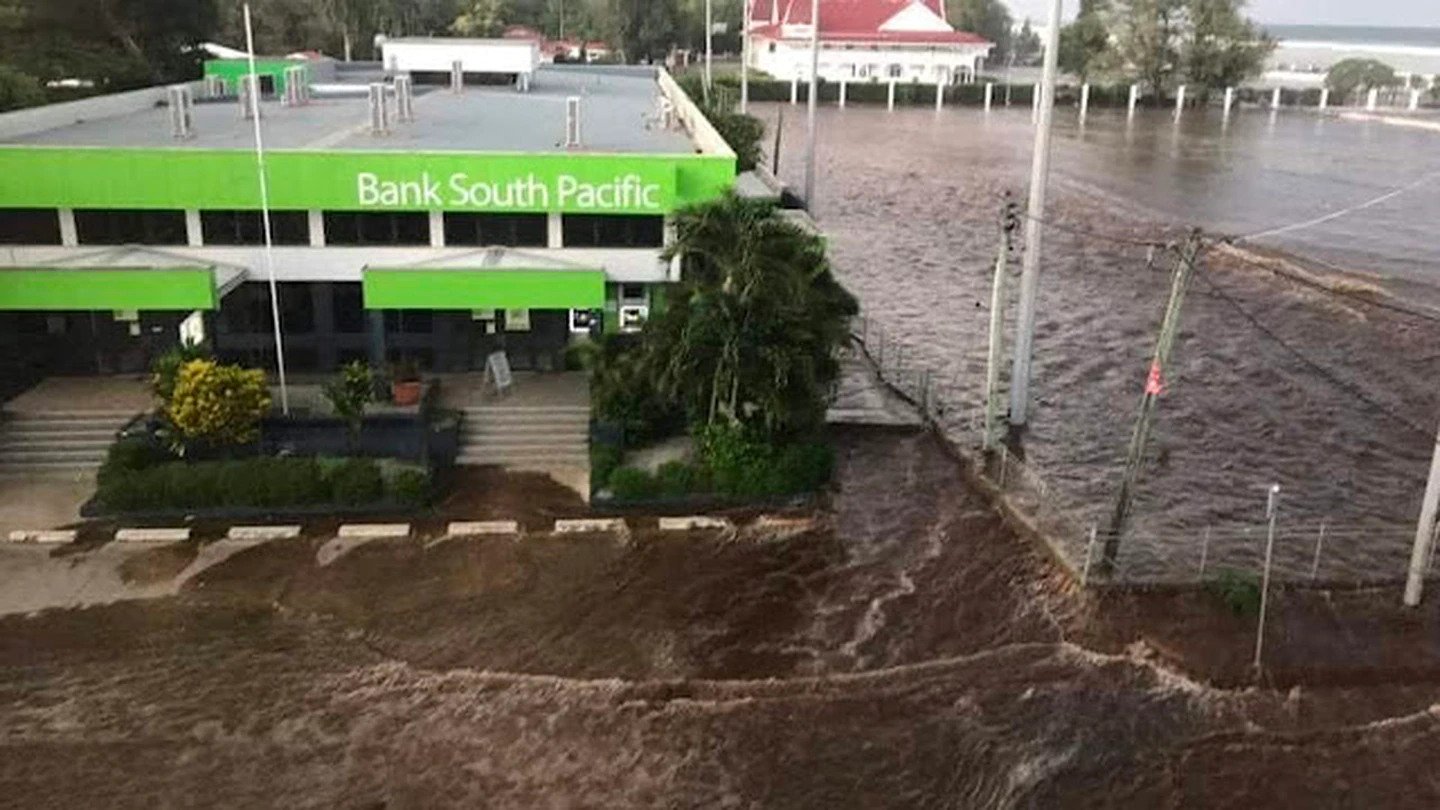
Tongan King's palace in the background as the streets are flooded by the tsunami waves. Photo / Supplied
A convoy of police and troops rushed the King to a villa at Mata Ki Eua as residents headed for higher ground.
Waves generated by the volcano inundated Nuku'alofa, flooding the Palace grounds, waterfront and the main street.
Warning for Pacific Islands, New Zealand and Australia
Tsunami alerts have been issued for Fiji, Samoa, American Samoa, Lord Howe Island and Norfolk Island. Residents of low-lying areas were urged to move to higher ground.
New South Wales, Queensland, Tasmania, Victoria, Macquarie Island were also all under tsunami warning, said the Australian Bureau of Meteorology.
The New Zealand Defence Force says it is monitoring the situation in Tonga and is ready to assist if requested by the Tongan Government. So far, no request has been made.
There have been multiple reports on New Zealand social media pages of loud booms being heard and houses shaking on Saturday evening.
The booms have been reported all over the country from Tauranga to Invercargill.
MetService says the "booms: are a surge in the air pressure. Some people around the country have also heard a rumble probably associated with the eruption.
Fiji
Reports in Fiji says tsunami waves have reached parts of Vanualevu in Fiji.
The Fiji Meteorological Service has issued an advisory, saying there's a risk of abnormal wave heights due to tsunami generated waves from Tonga.
Fijian Attorney-General Aiyaz Sayed-Khaiyum said air quality was being monitored and evacuation centres were being opened. People should move to higher ground if they needed to and avoid the shore line.
"As a matter of precaution, please cover all household water tanks and stay indoors in the event of rain due to the risk of rainfall being acidic."
The Fijian Secretary of Health, James Fong, says he heard the sound of a thunderclap all the way over in Fiji.
Dr Fong says the internet connection in the outer islands is poor but he says he is expecting a briefing from Tongan authorities.
Anthony Browne is in Fiji and told the Herald the eruption is still being heard and felt as far away as Nadi, Fiji.
"For the last hour there have been continuous explosive sounds with continuous rumbling, windows rattling and doors rattling."
Samoa and American Samoa
In Samoa, more than 100 families have reportedly been evacuated from villages on the southern side of the big island of Savaii after wave surges hit homes at Vailoa, Palauli, about 6pm.
Locals told Samoa's Eyespy Radio that "huge waves" struck the coastline and caused damage to houses in the villages of Palauli and Satupaitea.
Villagers reported windows "rattling" shortly beforehand and was what initially thought to be thunderstorms were remnants from the volcano eruption in Tonga.
The Samoa Meteorology division has said no evacuation is necessary, but it is understood many villagers have taken it upon themselves to head to higher ground.
"For the safety of the public, it is advised to not go near beaches or coastal areas," an alert said.
People on the other side of Savaii are also preparing for a late-night evacuation.
A local told the Herald there were no warnings being broadcast on television, but people living on the coast are preparing to leave.
"Sirens and bells are going off and we're packing just in case."
Reuters is reporting that tsunami waves measuring 60cm in height were observed by sea-level gauges at the capital of the US territory of American Samoa following volcanic activity in Tonga, quoting the US-based Pacific tsunami warning centre.
The tsunami threat continues and sea level fluctuations and strong ocean currents pose hazards along beaches in harbours, the tsunami monitor said in a statement to Reuters.
Volcano declared dormant on January 11
The Hunga Tonga-Hunga Haʻapai volcano is located about 30km south-east of Fonuafo'ou island in Tonga. It had been active from December 20, 2021, but was declared dormant on January 11.
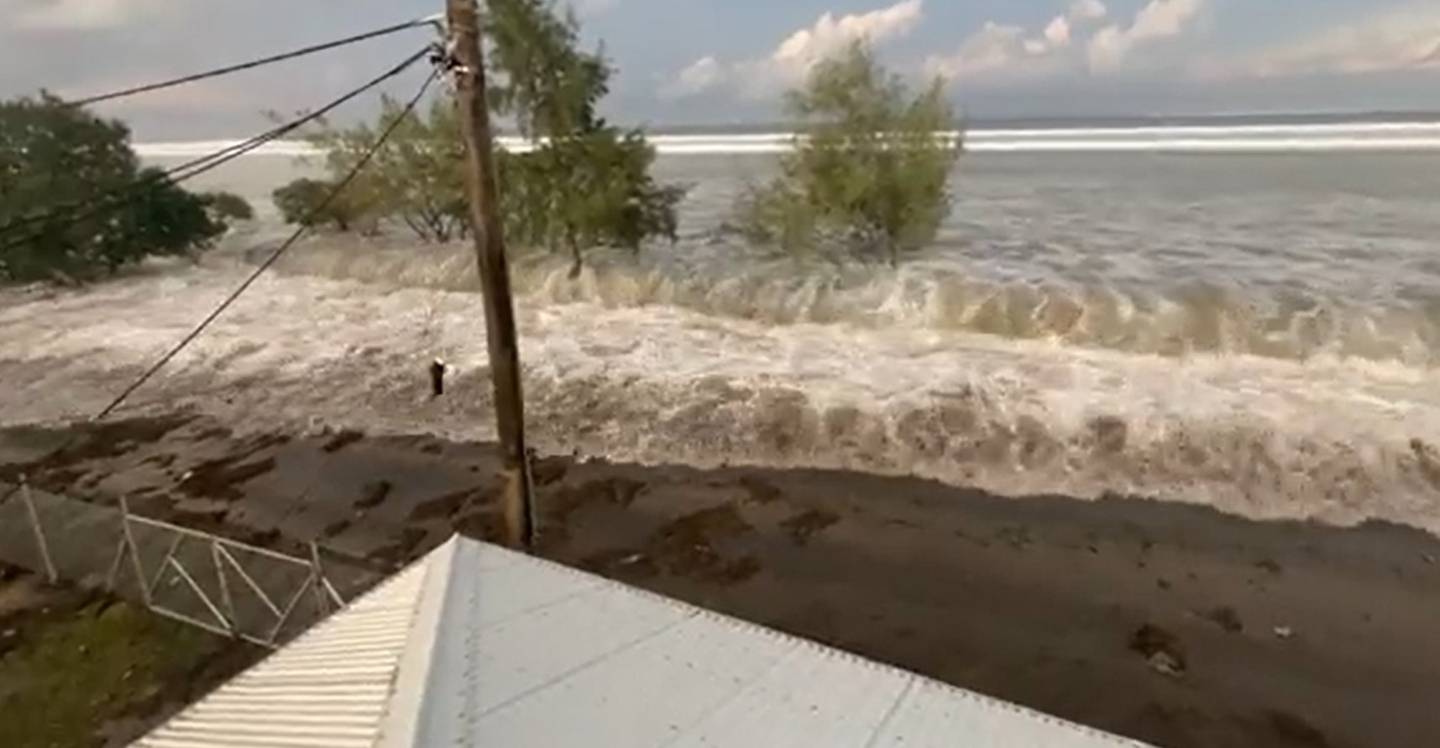
Footage posted on Twitter shows the waves coming ashore in Tonga. Photo / via Twitter
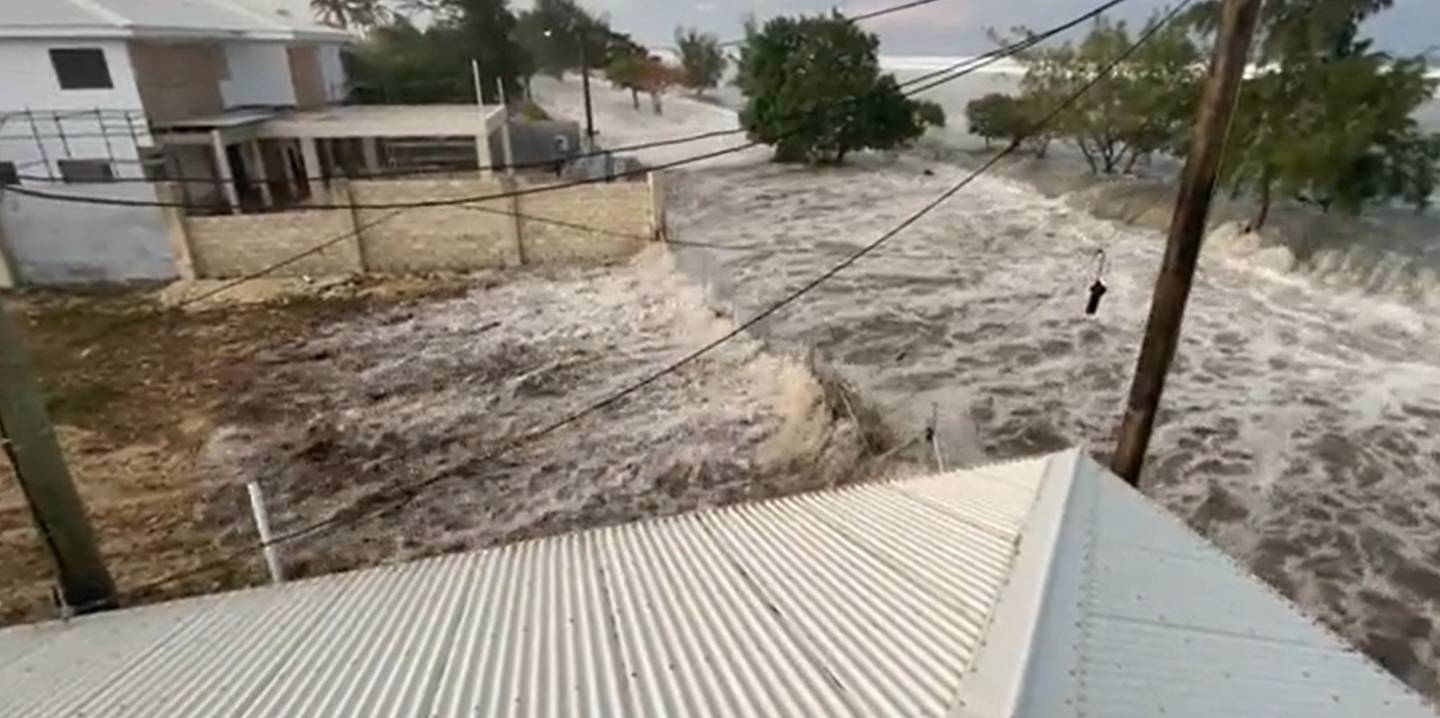
Footage posted on Twitter shows the waves coming ashore in Tonga. Photo / via Twitter

Footage posted on Twitter shows the waves coming ashore in Tonga. Photo / via Twitter
On Friday, several Tongan geologists went to observe the Hunga Tonga-Hunga Haʻapai volcano.
Taaniela Kula, Deputy Secretary, Ministry of Lands & Natural Resources – who was in charge of the group – told local media outlet Matangi Tonga: "Yesterday there were massive explosives, thundering lightning within two miles away, we observed and recorded.
"Big day yesterday indeed!. It was great getting out there during the volcano's peak hours. It's a geologist's dream to see actual geological events in process."
The ongoing plumes of debris from the volcano earlier saw a halt of flights in Tonga.
As of yesterday, the maximum tsunami wave had been recorded in Nuku'alofa tide gauge at 12:30pm and was about 30cm above sea level.
One-in-1000-year event, according to volcanologist
Scientists are predicting that Tonga's main island, Tongatapu, could be blanketed in ash this morning.
An Auckland University volcanologist, Shane Cronin, said the magma type erupted by Hunga-Tonga-Hunga-Ha'apai is called an 'intermediate composition' - similar to what comes from the Ruapehu volcano.
It was not especially rich in volatiles such as sulphur or fluorine, and as a result, this volcanic ash was not especially toxic.
However, he said, all volcanic ash could produce acid rain.
"Help will be needed to restore drinking water supplies."
Otago University geologist Marco Brenna estimated that Tonga's main island, Tongatapu, will be blanketed with a few millimetres to a few centimetres of ash today.
Dr Cronin said the Hunga eruption was a one-in-1000-year event.
Radiocarbon dating suggested one major eruption of this scale occurred about AD1100 and another in AD200, he said.
"This, along with other data from the volcanic ash records, suggests a recurrence interval of 900 to 1000 years for very large eruptions at the volcano.
"The current eruption seems to be one of these large events which fits with the timing since the last of these in [circa] AD1100."
- by George Clark with additional reporting by RNZ and agencies
Take your Radio, Podcasts and Music with you









